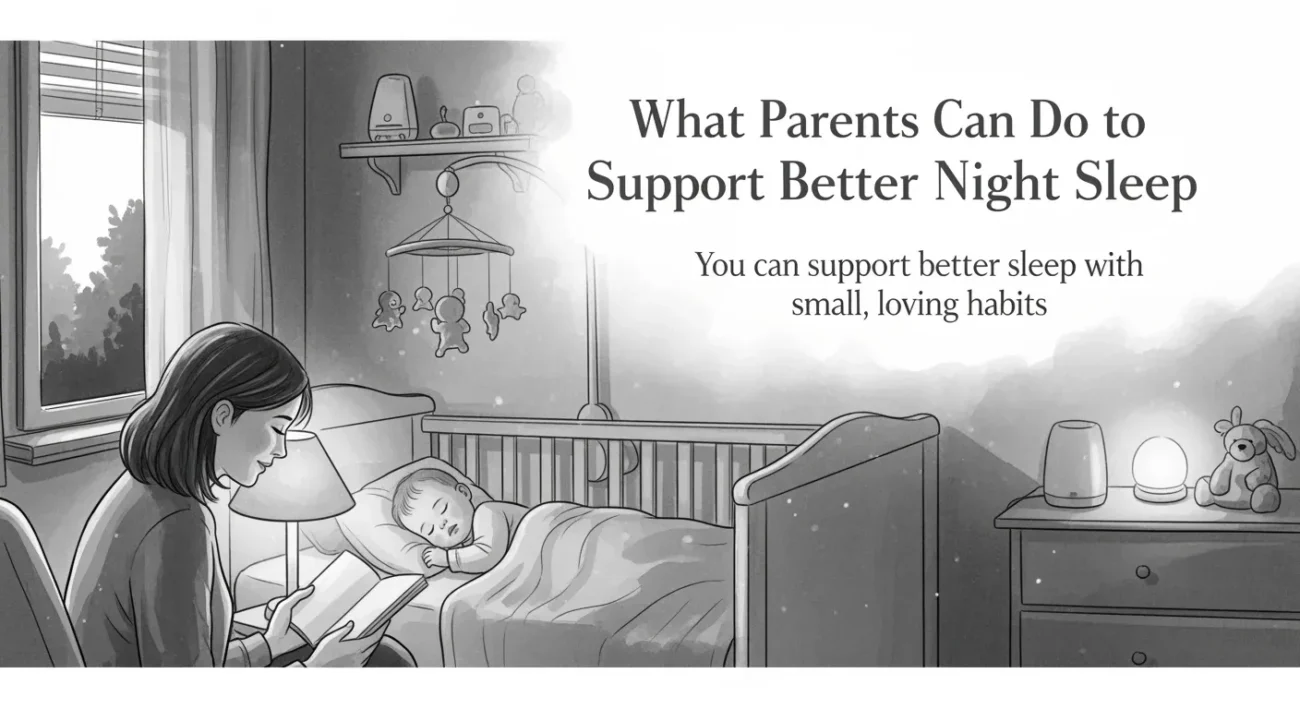When Do Babies Start Sleeping Through the Night? What You Need to Know

Most new parents lie awake at 2 a.m., wondering: When will my baby ever sleep through the night? It feels like a magic trick that everyone else has figured out but don’t worry, you’re not alone. This post explains what “sleep through the night” really means, when many babies reach that milestone, what slows things down, and what you can do to help. I’ve compared leading expert / parenting blogs to give you solid, up-to-date info with some new insights you may not have seen before.
What “Sleeping Through the Night”
First, let’s define this clearly so we’re all on the same page.
When people say “sleep through the night,” they often mean a stretch of sleep of several hours without needing parental intervention (feeding, soothing, diaper change). But how long is “several hours”? It depends on age and what the baby needs at each stage.
- In newborns: sometimes 3-4 hours is huge.
- In older infants (4-6 months): many define it as ~6-8 hours.
- Some parents use a longer standard: 10-12 hours, but that’s less common in early infancy.
So one baby “sleeping through the night” at 3 months might be very different in hours than one at 9 months.
When Babies Usually Start Sleeping Through the Night
Here’s a more detailed timeline health combining research + parental / clinical observations. Remember: there’s wide variation. Your baby might do it earlier or later and still be totally fine.
| Age | What Many Babies Can Do | What to Expect (Typical) | Things That Make It Harder |
|---|---|---|---|
| 0-2 months | Sleep short stretches (2-4 hours) at night; lots of feeding. Sleep mostly driven by hunger, immature circadian rhythm. | Frequent waking every 2-3 hours; no reliable long stretch. Light + dark cues irrelevant at first. | Premature, low birth weight, feeding issues, reflux, overstimulation. |
| 3 months | Some babies begin to manage a 4-6 hour stretch of sleep at night. Eye on weight gain, sleep environment, routines. | Often still need at least one feeding or soothing wake-up. Might wake up due to discomfort, gas, etc. | If day naps are too long or too many, if bedtime is inconsistent, or if sleep associations require parental help. |
| 4-6 months | Many babies are capable of 6-8 hour uninterrupted stretches, especially if they have the chance to self-settle. | Night feedings may still happen for some; naps consolidate (fewer, longer naps). Sleep regressions may occur (due to growth, developmental leaps). | Teething, illness, developmental milestones (rolling, crawling), changes in routine or environment. |
| 6-9 months | A good number of babies sleep most of the night (8-10 hours), with occasional wakings that they might be able to settle without you. | Night wakings more about need for comfort than hunger for many; routines more established. | Teething, separation anxiety, nap transitions (dropping from 3 naps to 2), travel, sickness & nutrition. |
| 9-12 months | Many babies regularly sleep through (according to their family’s definition) and can handle longer nights. Some may even do 10-12 hours uninterrupted. | Day naps usually settled; more predictability. Sleep regressions sometimes around 9-10 months. | New skills (pulling up, crawling, standing), separation anxiety peaks, changes (moving house, travel, siblings). |
| After 12 months | Nights are more consistent for many. But even toddlers may wake sometimes for teething, discomfort, or emotional reasons. | More stable bedtime rituals help; consistent environment and expectations. | Transition from crib to bed; disruptions; growth spurts; illness; typical “toddler stuff.” |
Newer / Less Mentioned Insights
Here are some details you might not see in many articles and I think they help fill in the picture.
- Genetics and temperament matter: Babies are born with different natural sleep tendencies. Some are lighter sleepers; others are deeply sound sleepers. That will affect when and how they sleep through. If your parents were light sleepers, your baby might be too.
- Minor medical issues can slow this: Issues like reflux, allergies (even mild ones), frequent colds, or ear infections can interrupt sleep. Sometimes also iron deficiency or low vitamin D. Checking with a pediatrician helps if night waking is frequent and seems related to discomfort.
- Role of weight gain and growth curves: Pediatricians often say that once babies are growing steadily on their growth curve, they are more likely to be able to stretch out night sleep. If weight gain is slow, it may be unsafe or impractical to expect long stretches until feeding needs are better met.
- Sleep environment & day/night cues: Light exposure, noise, room temperature, consistency of bedtime routines are huge. Babies need help learning what night vs day look like. Dim lights at night, bright light during day, consistent bedtime ritual bath, quiet song, dim room these help their internal clocks.
- Self-soothing / sleep associations: How your baby falls asleep matters. If every time they fall asleep (at bedtime or naps) they are rocked, fed, or held until deeply asleep, then when they naturally shift between light/deep sleep cycles (every ~45-60 min), they may need those same supports in the night. Helping them learn to fall asleep with minimal intervention (“drowsy but awake”) helps them learn to put themselves back to sleep.
- Backtracking happens: Even when babies do sleep through, regressions are very common. Reasons include developmental milestones, teething, separation anxiety, illness, changes in schedule. It’s totally normal, and continuity in routine helps them bounce back.
- Cultural / parental expectations vary a lot. What “through the night” means in one family may be different in another cultural context. Also, parental flexibility and mental health can affect how parents perceive night wakes. Sometimes what looks like waking might be partial awakenings that parents don’t even notice.
When You Might Expect Your Baby to Sleep Through the Night

Putting together the research + variation + new insights, here are “milestones” you might aim for just rough guideposts, not strict deadlines.
- By 3 months: Some babies may sleep 4-6 hour stretches. If your baby is growing well, has a somewhat regular day schedule, and a bedtime routine, this is realistic.
- By 4-5 months: Many babies can sleep 6-8 hours. Parents who do gentle sleep guidance or support self-settling may see this happen.
- By 6 months: A majority can sleep longer periods. Night feedings often drop in many cases.
- By 9-12 months: Many babies regularly sleep through (according to family’s definition). Night wakings are less frequent and often easier to settle.
If your baby hasn’t got there yet, that’s okay. It does not mean something is wrong just that more time, consistency, or small changes might help.
What Parents Can Do to Support Better Night Sleep
You can help your baby move toward sleeping through the night. Here are strategies that have good evidence and work-in-real-life:
Create a consistent bedtime routine
Having a nice, calm ritual before bed helps cue the brain. For example: bath → dim lights → story or lullaby → feeding → put down drowsy but awake. Doing the same things in the same order every night builds cues.
Help with day/night cues
Make daytime bright, active, with interesting stimulation. At night, reduce light, noise, interaction. Let the baby learn that nighttime is for rest. Exposure to natural daylight early in the day helps regulate sleep hormone rhythms.
Encourage self soothing
This means giving the baby chances to fall asleep without being held, rocked, or nursed into deep sleep every time. When they wake between sleep cycles, they may be able to go back to sleep without you. You don’t have to leave them alone crying; gentle methods help.
Watch naps
Good daytime sleeps matter. If naps are too long or too late, bedtime gets harder; overtiredness can lead to more night waking. As babies grow, reduce the number of naps as appropriate (e.g., going from three naps to two, then to one).
Make sure feeding / nutrition is good
If the baby is well-fed during the day, with sufficient calories, night waking for hunger reduces. If breastfeeding, often frequent feeds early help; if formula, making sure volume is adequate. Talk to pediatrician if weight gain is a concern.
Optimize sleep environment
Ensure crib is safe, mattress firm; room is dark enough; noise level consistent (some babies like white noise); temperature comfortable (not too hot or cold).
Be consistent but flexible
It’s helpful to set routines; but when regressions occur (teething, milestones), don’t feel like you failed. They’re normal. Also, travel, sickness, changes in household will disrupt sleep. Flexibility with expectations helps your mental health too.
Summary
“Sleeping through the night” doesn’t happen at the same age for every baby it’s a gradual process. In the first 0–3 months, frequent wake-ups are the norm. By around 4–6 months, many babies start managing longer stretches of 6–8 hours, and after 6 months, even more begin sleeping longer at night. By 9–12 months, solid nights are common, though occasional waking is still normal. If your baby isn’t there yet, don’t worry good sleep habits, patience, and consistency usually lead to steady progress over time.
